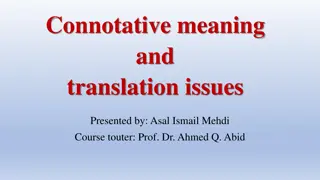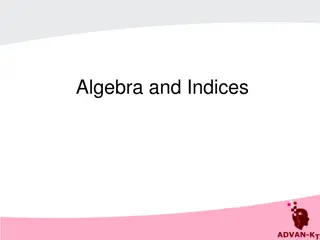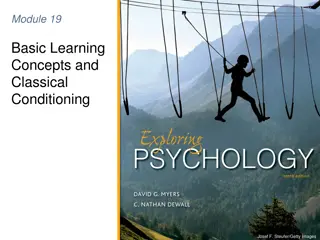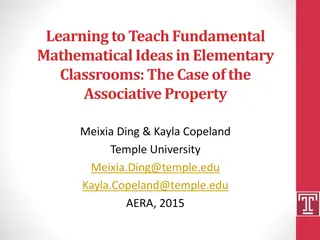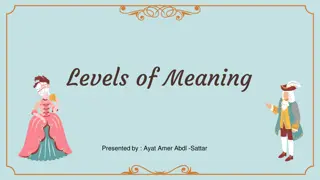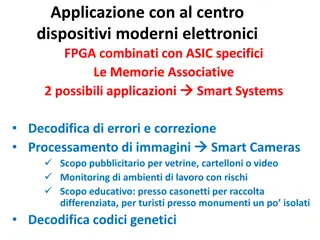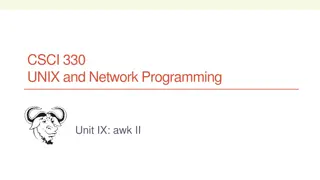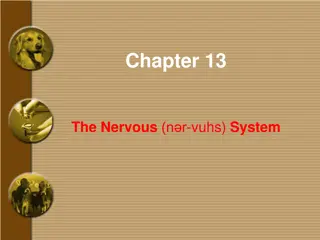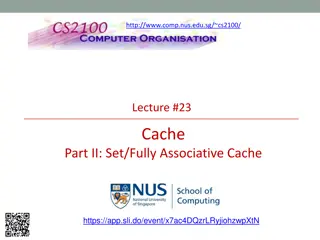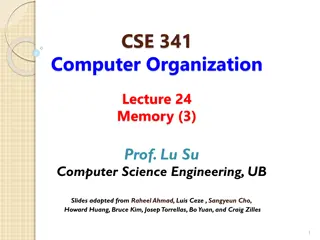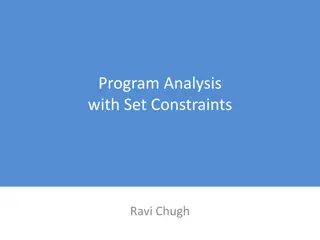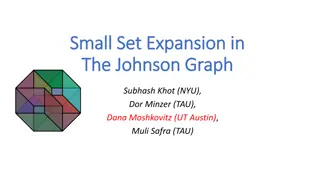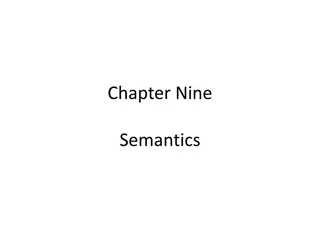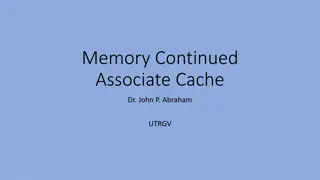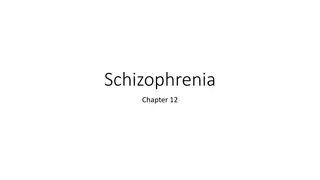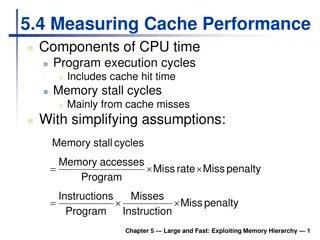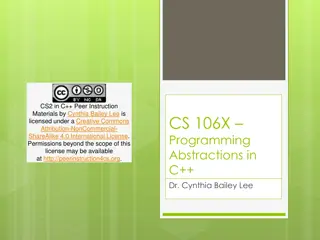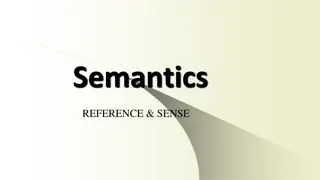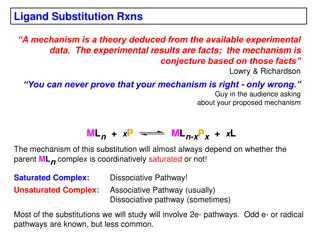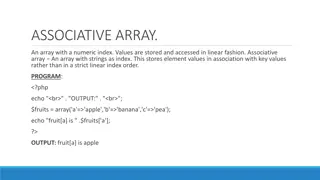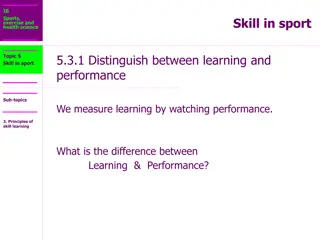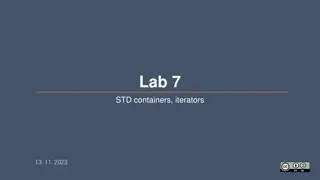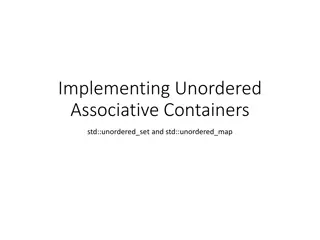Introduction to Projective Diagnostic Assessment
Projective diagnostic assessment is a technique used to reveal subconscious psychological states by presenting ambiguous stimuli for individuals to project their thoughts and feelings. This method helps uncover unconscious conflicts and allows for personality assessment through the interpretation of
4 views • 12 slides
Exploring Factors and Multiplication in Math
Dive into the world of breaking factors into smaller elements and using the associative property in multiplication. Discover patterns and strategies for solving math problems efficiently with these visual representations.
1 views • 31 slides
Understanding Connotative Meaning and Translation Issues
Exploring the complexities of connotative meaning within texts, this article discusses the various types of connotative meanings and the challenges they pose for translation. It delves into attitudinal, associative, and affective meanings, emphasizing the importance of recognizing and preserving the
1 views • 17 slides
Understanding Whole Numbers and Basic Properties
Whole numbers are a collection that includes natural numbers and zero. They are denoted by the letter W and start from 0, 1, 2, 3, 4, 5, 6, and so on. The successor of a whole number is obtained by adding 1, and the predecessor is obtained by subtracting 1 (except for 0). The number line begins at 0
2 views • 7 slides
Algebra Rules and Properties
Explore the fundamental rules and properties of algebra and indices, including commutative, associative, and distributive properties. Learn about negation, zero properties, and the zero factor property, illustrated with examples and common errors. Engage in activities to apply and test your understa
1 views • 21 slides
Understanding Basic Learning Concepts and Classical Conditioning
Acquiring new information and behaviors through experience is known as learning. One common way we learn is through associative learning, where we connect certain events together. This process can take the form of classical conditioning, where stimuli evoke automatic responses, or operant conditioni
1 views • 14 slides
Understanding Sorting Algorithms in Data Structures
Delve into the world of sorting algorithms in data structures through comprehensive coverage of concepts, performance optimization tips, and associative set/map implementations. Explore various sorting strategies and understand the importance of efficient coding practices for enhanced runtime perfor
0 views • 82 slides
Theories of Human Development in Psychomotor Domain
The psychomotor domain involves the development of muscle skills associated with mental processes. Psychomotor development progresses through cognitive, associative, and autonomic stages, where individuals learn to perform new skills that involve both the body and mind. In the cognitive stage, one n
0 views • 12 slides
Understanding Rational Numbers: A Comprehensive Overview
Discover the world of numbers with this comprehensive guide on different types of numbers, focusing on rational numbers. Learn about natural numbers, whole numbers, integers, and how rational numbers are represented on a number line. Dive into the properties of rational numbers and explore the conce
2 views • 19 slides
Multiplying by 3 Numbers Lesson: Associative Property and Problem-Solving
Explore the concept of multiplying three numbers and utilizing the Associative Property of Multiplication. Understand how changing the grouping of factors doesn't affect the product. Engage in problem-solving scenarios involving multiple multiplication operations. Enhance your skills through real-wo
1 views • 20 slides
Unpacking the Associative Property of Multiplication in Elementary Classrooms
This study delves into how prospective teachers transform learned specialized content knowledge from professional development to elementary classrooms, focusing on the associative property of multiplication. The research explores the process of unpacking worked examples through representation uses a
1 views • 19 slides
Understanding Levels of Meaning in Language
Explore the concept of denotation versus connotation and delve into the various types of connotative meanings including attitudinal, associative, affective, and allusive meanings presented by Ayat Amer AbdI.-Sattar. Discover how words can carry multiple layers of meaning beyond their literal interpr
0 views • 16 slides
Understanding Many-to-Many Relationships in Relational Databases
Exploring the intricacies of many-to-many relationships in database design through the use of associative entities. Learn why a third entity is essential, how to create relational databases with foreign keys, and the importance of identifying relationships. Dive into MySQL Workbench symbols and the
0 views • 26 slides
Innovative Applications of Associative Memory in Modern Electronic Devices
Explore the diverse applications of combining FPGA with specific ASICs and associative memories in smart systems, error decoding, image processing, advertising displays, and workplace monitoring. Learn about Content Addressable Memory (CAM) utilization, pattern matching techniques, and real-life exa
0 views • 18 slides
Introduction to Awk: Powerful Text Processing Tool in UNIX
Awk is a versatile text processing tool in UNIX that allows users to scan files, manipulate and format data, and generate reports efficiently. With awk, users can split input lines into fields, compare them to patterns, and perform actions based on matches. This tool supports various programming con
0 views • 30 slides
Understanding the Nervous System: A Comprehensive Overview
The nervous system consists of the central nervous system (CNS) and peripheral nervous system (PNS), with neurons as its basic unit. Neurons function as sensory, associative, and motor types, carrying impulses within the body. Parts of a neuron include the cell body, dendrites, axon, and terminal en
2 views • 86 slides
Understanding Cache Memory Designs: Set vs Fully Associative Cache
Exploring the concepts of cache memory designs through Aaron Tan's NUS Lecture #23. Covering topics such as types of cache misses, block size trade-off, set associative cache, fully associative cache, block replacement policy, and more. Dive into the nuances of cache memory optimization and understa
0 views • 42 slides
Understanding Children's Play Development: Connecting Nature and Environment
Outdoor play connects children, both typical and atypical, to nature and their surroundings, fostering cognitive skills and imaginative play. Piaget and Vygotsky emphasized the importance of symbolic thought in play, leading to language development and diversification of skills like expression, inde
0 views • 15 slides
Understanding Cache Memory Organization in Computer Systems
Exploring concepts such as set-associative cache, direct-mapped cache, fully-associative cache, and replacement policies in cache memory design. Delve into topics like generality of set-associative caches, block mapping in different cache architectures, hit rates, conflicts, and eviction strategies.
0 views • 35 slides
Understanding the Seal of Origin Program in Chile
The Seal of Origin Program in Chile aims to add value to traditional products by emphasizing their specific geographical origins and unique qualities. It includes seals, geographical indications, appellations of origin, and certification marks to highlight the authenticity and standards of products.
0 views • 31 slides
Understanding Program Analysis with Set Constraints
Explore the concept of program analysis with set constraints, delving into techniques like set-variable-based analysis, constant propagation, and constraint graphs. Learn about term constraints, additional implicit constraints, and function calls in the context of set-constraint based analysis. Gain
0 views • 49 slides
Fundamentals of Binary Logic: Definitions and Postulates
Binary logic involves concepts such as closure, associative law, identity element, additive and multiplicative operators, distributive law, and inverses. These concepts define the behavior of binary operators on sets, including addition, subtraction, multiplication, and division in relation to speci
0 views • 8 slides
Understanding Sets Theory Fundamentals
Sets in mathematics are unordered collections of objects, with elements referred to as members of the set. The concept includes defining sets, examples like vowels in the English alphabet and important sets such as natural numbers and rational numbers. It covers enumeration methods, set-builder nota
0 views • 16 slides
Understanding Small Set Expansion in Johnson Graphs
In this detailed piece, Subhash Khot, Dor Minzer, Dana Moshkovitz, and Muli Safra explore the fascinating concept of Small Set Expansion in Johnson Graphs. The Johnson Graph is defined as a representation where nodes are sets of size K in a universe of size N, and two sets are connected if they inte
0 views • 14 slides
Exploring Semantics: Meaning of Words and Concepts
Semantics is the study of the meaning of words, ranging from their basic literal components to their associative connotations. This branch of linguistics focuses on objective meaning shared by all rather than subjective interpretations. Concepts like conceptual and associative meanings are explained
0 views • 22 slides
Understanding Cache Memory in Computer Systems
Explore the intricate world of cache memory in computer systems through detailed explanations of how it functions, its types, and its role in enhancing system performance. Delve into the nuances of associative memory, valid and dirty bits, as well as fully associative examples to grasp the complexit
0 views • 15 slides
Understanding Schizophrenia: Symptoms and Definitions
Schizophrenia is a complex mental disorder characterized by delusions, hallucinations, disorganized speech, and negative symptoms. It involves a significant decline in functioning and must persist for at least 6 months. Common terms associated with schizophrenia include catatonia, paranoia, associat
0 views • 10 slides
Understanding Hypertext Fundamentals: A Comprehensive Overview by Dr. Nicholas Gibbins
Hypertext, as defined by pioneers like Ted Nelson and Mike Sendall, is a form of non-linear writing that allows for dynamic display and branching capabilities. This concept originated in the 1960s and has evolved to become a fundamental aspect of the World Wide Web. The interactive and associative n
0 views • 33 slides
Understanding Cache Performance Components and Memory Hierarchy
Exploring cache performance components, such as hit time and memory stall cycles, is crucial for evaluating system performance. By analyzing factors like miss rates and penalties, one can optimize CPU efficiency and reduce memory stalls. Associative caches offer flexible options for organizing data
0 views • 22 slides
The Great Depression and Herbert Hoover's Presidency
Herbert Hoover's presidency during the Great Depression was marked by his belief in individualism and limited government intervention. Despite his initial stance against direct government aid, Hoover eventually established the Reconstruction Finance Corporation to provide assistance during the econo
0 views • 14 slides
Understanding C++ Data Structures and Programming Concepts
Explore key programming concepts in C++, including event queues, linear and associative containers, and the implementation of the Map ADT. Learn about the usage of queues for event handling, different categories of Abstract Data Types (ADTs), and the distinction between linear and associative contai
0 views • 16 slides
Understanding Semantics: Analyzing Meaning in Linguistics
Semantics is a branch of linguistics focusing on the meaning of words, phrases, and sentences. It involves analyzing semantic features, roles, and relationships between words to understand conceptual meanings. Explore the association between words and their associative meanings, with a spotlight on
0 views • 13 slides
Understanding Different Types of Child Play Behavior
Explore the various stages of play behavior in children, from unoccupied and onlooker behavior to solitary, parallel, associative, and cooperative play. Learn how children interact with toys and each other at different developmental stages, shaping their social skills and creativity. Discover the di
0 views • 12 slides
Understanding Semantics: Meaning, Reference, and Sense
Explore the intricate world of semantics through an analysis of meaning, reference, denotation, connotation, and the classification of meaning by G. Leech. Delve into the concepts of conceptual and associative meanings, and understand the importance of sense in expressions. Learn how connotations pl
0 views • 32 slides
Understanding Ligand Substitution Reactions in Metal Complexes
Ligand substitution reactions in metal complexes involve the replacement of one ligand with another, impacting the coordination around the metal center. The mechanism of these reactions, associative or dissociative, is influenced by factors like coordination saturation and electron count. Experiment
0 views • 20 slides
Understanding Arrays in PHP Programming
Arrays in PHP play a crucial role in storing and manipulating data efficiently. This snippet demonstrates the use of numerical and associative arrays, modifying elements, removing array elements, retrieving array size, handling nested arrays, and processing arrays with loops in PHP. Explore various
0 views • 9 slides
Effects of Celebrity Endorsements on Brand Equity and Self-Brand Connection
This research examines the impact of celebrity endorsements on brand equity and self-brand connection. It explores the effects of endorser credibility on consumer-based brand equity and self-concept implications of endorsements. The study uses theoretical frameworks such as associative-network memor
0 views • 11 slides
Understanding the Difference Between Learning and Performance in Sports Science
Learning in sports refers to a relatively permanent change in performance through experience, excluding maturation and degeneration, while performance is a temporary occurrence that fluctuates over time. Coaches must consider these differences when designing training sessions for improving both perf
0 views • 48 slides
Understanding STD Containers and Iterators in C++ Programming
In C++ programming, STD containers and iterators play a crucial role in managing data structures and traversal methods efficiently. By utilizing these tools effectively, programmers can enhance the performance and reliability of their code. This involves working with various container types, such as
0 views • 33 slides
Understanding Unordered Associative Containers in C++
Explore the implementation of unordered associative containers like std
0 views • 21 slides


